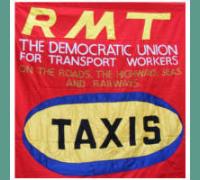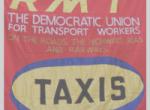Taxi Union RMT on High Court Ruling on Need for Statutory Definition of Plying for Hire
Taxi union RMT said today that while it notes the decision of the High Court on whether the Uber app involves the use of a taxi meter, this was always a peripheral issue as the focus of RMT’s campaign has been and remains the need for a statutory definition of who can and what precisely is “plying for hire”.
Specifically, for clear safety reasons, existing regulations state that private hire vehicles (minicabs) may only pick up passengers when pre-booked – rather than from a rank or in response to being hailed. However, the definition of plying for hire is based on case law built up over decades and would be more coherent and therefore easier to enforce if defined in legislation.
At root this is about how to limit the incidences of unlicensed drivers preying on vulnerable passengers. It is an issue that has vexed regulators for some time, which is why the need for restrictions on why can ply for hire were first introduced.
After careful consideration of all the facts, Transport for London has reached the informed and mature position that the Uber app (as currently operated) involves unacceptable risks to the travelling public. Transport for London shares our view that new legislation is required.
RMT welcomes Transport for London’s change of heart as evidenced in its current consultation and now with the publication of its 2015 strategy document for the sector. We are pleased that (at page 30 of http://content.tfl.gov.uk/taxi-and-private-hire-strategy2.pdf) TfL publicly supports the concept of a statutory definition of plying for hire and call on the government to accept this expert advice.
Mick Cash, RMT General Secretary, said:
“RMT's fight to defend the taxi industry from the on-going assault on the right to ply for hire continues.
"The union notes the important decision of the High Court which gives us an opportunity to keep the issue of the statutory definition of plying for hire, and the safety of the travelling public, right under the spotlight."
- 4448 reads




